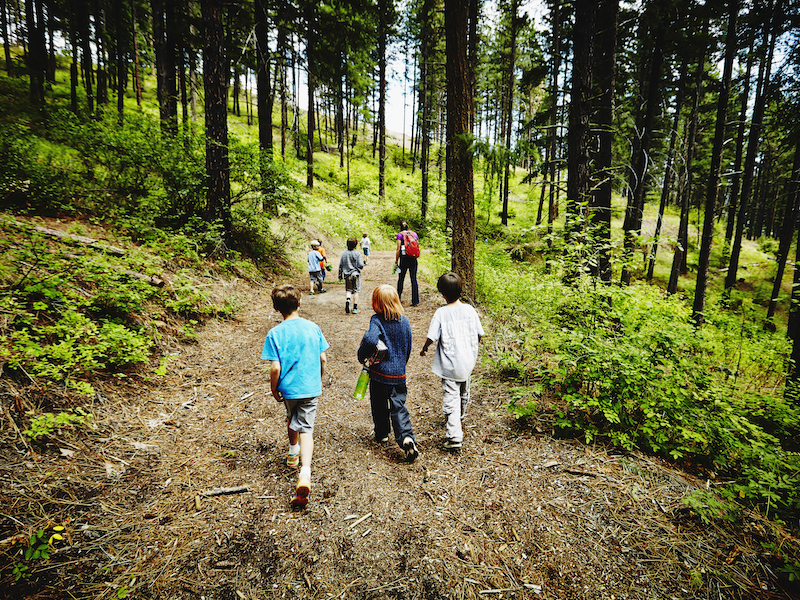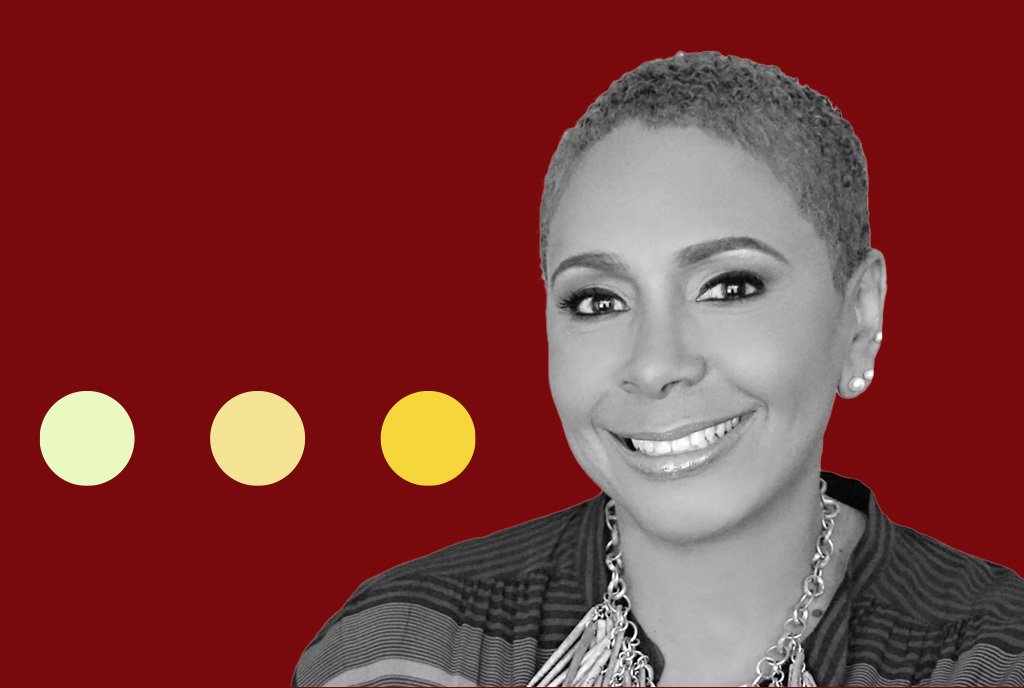In today’s society, inclusivity is becoming increasingly important. Creating an inclusive environment in all aspects of life, including recreational activities, has a profound impact on individuals with disabilities and the community at large. One such remarkable setting where inclusivity thrives is an inclusive camp. These camps foster an environment that welcomes both disabled and non-disabled campers, providing unique and transformative experiences for all participants.
I have written before about my own disastrous and only experience at overnight camp over 50 years ago. The camp was not prepared in any way to support a camper with a visual impairment. I was most likely allowed to go to camp because they didn’t know the extent of my vision loss, and, of course, they didn’t ask. Back in my day if you were disabled you went to a “special” camp for kids with disabilities, if you went to camp at all.
Thomas Barwick/Getty Images
A group of kids walks on a trail at summer camp.
I hated camp. I didn’t understand why my siblings looked forward to it every summer and went back year after year. When my own children wanted to go, I certainly enabled them because their friends were going and they wanted to go, but the whole experience was always a trigger for me. It caused me some anxiety and angst and when my children insisted on going back year after year, I began to feel like I had missed out on an experience that really seems to be a childhood rite of passage.
I am pretty sure I would not have been happy going to camp with only disabled kids; I didn’t see myself as “disabled” and I didn’t want to be different from my peers.
In the last few years while serving on the board of Keshet, I have seen a very different kind of camp experience that, had it been available when I was a kid, probably would have ensured that I did not look back at my overnight camp experience as a traumatic event.
Keshet supports children and young adult campers in day and overnight camp, offering them full inclusion with their non-disabled peers. This means that kids with disabilities are in groups and bunks with their non-disabled peers; they participate in all activities alongside their non-disabled peers; and they have all the same opportunities. Kids with disabilities are not segregated, but fully integrated into camp life.
There are benefits of an inclusive camp environment for both our disabled and non-disabled children. Inclusive camps offer a valuable opportunity for campers to interact and engage with individuals from diverse backgrounds. Through shared experiences and interactions, disabled and non-disabled campers develop empathy, understanding and acceptance of each other’s differences. Breaking down barriers and misconceptions, inclusive camps create a space where campers learn to appreciate the unique abilities and perspectives of others, fostering a more inclusive society.
For disabled campers, an inclusive camp provides an empowering environment where they can participate in activities alongside their non-disabled peers. These camps focus on abilities rather than disabilities, allowing individuals to showcase their talents and skills. By experiencing success and recognition, campers with disabilities gain confidence, leading to improved self-esteem, positive expectations for themselves and a sense of accomplishment. Similarly, non-disabled campers develop a greater appreciation for their own abilities and gain a new perspective on their own challenges through witnessing the resilience and determination of their disabled peers.
Inclusive camps serve as a platform for campers to develop and strengthen their social skills. Through cooperative activities, teamwork and shared responsibilities, disabled and non-disabled campers learn effective communication, problem-solving and cooperation. The camp environment encourages campers to collaborate, support each other and work towards common goals, fostering meaningful connections and lifelong friendships.
This kind of camp gives me hope for the future.
Participating in an inclusive camp allows campers to step outside their comfort zones and embrace new experiences. Disabled campers often find themselves challenged in ways they may not have encountered before, while non-disabled campers have the opportunity to learn from and support their disabled peers. These encounters foster personal growth, resilience, adaptability and a greater appreciation for diversity. The inclusive camp experience equips campers with valuable life skills that they can carry forward into their personal and professional lives.
By providing an inclusive environment at camp, a ripple effect is created beyond the campgrounds. Campers return to their communities with newfound understanding and a commitment to fostering inclusivity. They become advocates for equality, breaking down barriers and promoting accessibility in their schools, workplaces and local communities. Inclusive camps play a pivotal role in shaping future leaders who prioritize inclusivity and contribute to a more equitable society.
Inclusive camps have immeasurable benefits for both disabled and non-disabled campers. By embracing diversity and breaking down barriers, these camps foster empathy, self-confidence, social skills, personal growth and a commitment to inclusivity. The transformative experiences gained at inclusive camps have a lasting impact on individuals’ lives, promoting understanding and acceptance beyond the camp setting. As we strive towards a more inclusive society, inclusive camps stand as powerful examples of what can be achieved when individuals of all abilities come together, supporting and empowering one another.
Having had the opportunity the last two years to visit truly inclusive camps, I feel as if I see the future in these camps, a future that extends beyond the summer and beyond just the camp, a future in which our world as a whole is more inclusive and where disability will be considered just a part of the human experience and not something to be feared or pitied.
I also realize 50-something years later — I need a camp redo!
Michelle Friedman is the board chair of Keshet in Chicago, a member of Disability Lead and The JDC Israel Unlimited Global Accessibility Advisory committee. She is a disability advocate, speaker and writer on disability issues.
Credit:Source link



